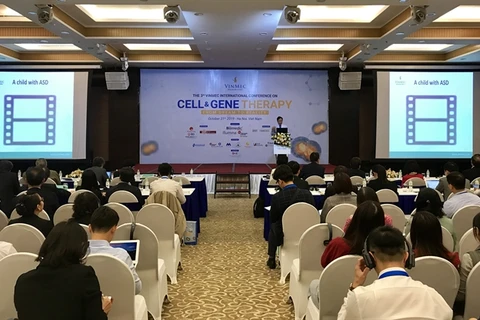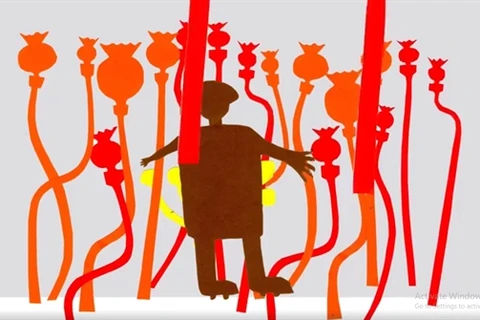Hanoi (VNA) – Vietnam has become one of the pioneers in the world in research and application of stem cell therapy to treat autism spectrum disorder (ASD) following new findings of the research body of Vinmec, a member of VinGroup.
The study “Outcomes of bone marrow mononuclear cell transplantation combined with interventional education for ASD" by Vinmec Research Institute of Stem Cell and Gene Technology (VRISG) was published in the September 2020 issue of the internationally renowned scientific journal Stem Cells Translational Medicine from the US.
The study was conducted by scientists from the VRISG in cooperation with their peers from the US-based Stanford University and the UK’s Keele University since 2016.
Accepted by the Ministry of Health in September last year, this is the first ever study on stem cell therapy in the treatment of autism in Vietnam.
Vinmec's research is more comprehensive compared to previous international studies on treatment of children with ADS by stem cell transplantation. There are many outstanding advantages from clinical assessment to brain metabolism assessment by Positron emission tomography‐computed tomography (PET‐CT) and whole exome sequencing test of patients and their parents.
The results of the study show that the combination of cell therapy and educational intervention may improve clinical manifestations in children with ASD.
In the study, patients received autologous stem cells in two transplantations of high-dose bone extraction which were transmitted through the spinal cavity to get the most access to the brain. In addition to stem cell transplantation, children also received combined treatment with active interventional education.
Specially, Vinmec scientists also conducted genome analysis of children with ASD and their parents to find genetic mutations, evaluate the effect of genetic mutations on response to treatment, and progression after stem cell transplantation, among others.
Clinical examinations were performed before and after the first transplantation by an experienced paediatric psychologist and a paediatric psychiatrist who were not members of the research team to ensure the objectivity and reliability of the results. In addition to expert assessment, the study also collected assessment results from teachers and parents to ensure results were determined in a multidimensional manner. In the study, all children received 18 months of follow‐up after the first transplantation which exceeds those in other recent reports. The researchers noticed that the longer the follow‐up duration was, the better the results were demonstrating the sustainability of treatment effects.
“The clinical finding showing that the cell therapy treatment safely reduced severe ASD characterisations in children is encouraging,” said Prof. MD Anthony Atala, Editor‐in‐Chief of Stem Cells Translational Medicine and Director of the Wake Forest Institute for Regenerative Medicine from the US. “The findings are promising and open the opportunity for the development of a translational medicine approach that could help affected children,” Atala said in an article.
After stem cell transplantation, 90 percent of children with ASD improved markedly their social communication, language, and daily skills. Before transplantation, expressive language occurred in 47 percent of children only but after transplantation did the figure increase to 93 percent. The rate of children with hyperactivity disorder decreased by 50 percent; the number of children who could go to school without support increased. Besides, the severity of ASD decreased remarkably.
As an internationally renowned scientific journal, the Stem Cells Translational Medicine is Q1 - Top prestigious journals in the field of stem cell application in the world. This study is the second scientific paper on ASD by Vinmec in the past three years published by international journals. In November 2019, Vinmec published its scientific article on Investigation of genetic mutations in Vietnamese children with autism spectrum disorder.
As reported by the US Centers for Disease Control and Prevention (CDC), the overall autism spectrum disorder prevalence was of 18 per 1000 children aged eight years old. ASD is a complex spectrum of disorders characterised by deficits of social communication and interaction; the presence of restricted interests as well as repetitive and stereotypic verbal and nonverbal behaviors./.

Art exhibition by children with autism opens in Hanoi
An art exhibition displaying works by children with autism has been opened in the capital city of Hanoi.























